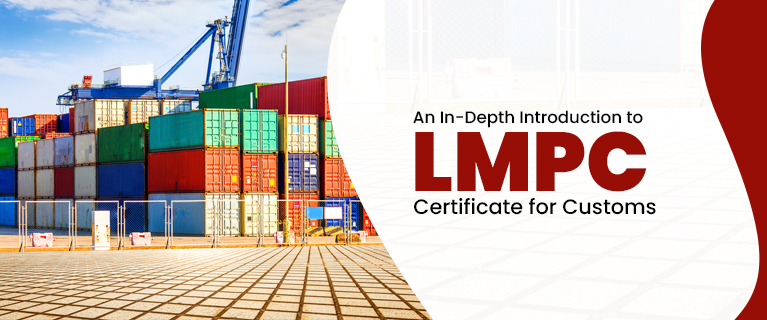An In-Depth Introduction to LMPC Certificate for Customs
In the intricate landscape of international trade, businesses navigate a complex web of regulations and standards to ensure the seamless export and import of goods. Among the myriad compliance requirements, adherence to legal metrology and packaging standards stands out as pivotal. This adherence is encapsulated in the Legal Metrology and Packaging Compliance (LMPC) Certificate for Customs, a document that plays a crucial role in facilitating smooth customs clearance and ensuring products meet regulatory requirements.
Legal Metrology and Packaging Compliance:
At its core, the LMPC Certificate serves as a testament to a company’s commitment to compliance with legal metrology and packaging regulations. Legal metrology, the science of measurement in trade, demands precision and accuracy to safeguard consumers and promote fair trade practices. Packaging standards, on the other hand, dictate how products should be securely packaged, contributing to product safety and integrity during transportation and storage.
Read also this -: The Significance of LMPC Consultant Firm in India
The significance of the LMPC Certificate reverberates across international borders. For businesses engaged in global trade, this certification becomes a passport for their products, allowing them to traverse customs checkpoints with ease. Without it, goods may face delays, additional scrutiny, or even rejection at customs, leading to disruptions in the supply chain and financial setbacks.
Understanding the application process for the LMPC Certificate is paramount for businesses aiming to navigate the global marketplace successfully. Typically, this involves a detailed submission of documentation, including product specifications, testing reports, and evidence of compliance with legal metrology and packaging standards. Authorities responsible for issuing the certificate meticulously review these submissions to ensure that products align with the applicable regulations.
The LMPC Certificate goes beyond being a mere bureaucratic requirement; it is a cornerstone of fair and standardized trade practices. By upholding legal metrology and packaging standards, businesses contribute to a level playing field where consumers can trust the accuracy of measurements and the safety of packaged products. Moreover, this certification fosters a global trade environment where transparency and adherence to regulations are paramount, benefiting both businesses and consumers alike.
In this comprehensive guide, we will delve into the key aspects of the LMPC Certificate for Customs, unravelling its significance, exploring the intricacies of the application process, and highlighting its role in promoting fair and standardized trade practices on the international stage.
The LMPC Certificate for Customs serves as a tangible demonstration of a product’s commitment to complying with legal metrology and packaging standards. Legal metrology involves regulations pertaining to weights, measures, and packaging. It ensures that products are precisely labelled and securely packaged, fostering consumer confidence and fair trade practices. This certification is particularly vital for businesses engaged in cross-border trade, where adherence to international standards is non-negotiable.
Read also this -: How to Apply LMPC Certificate Online
Significance for Customs Clearance:
The LMPC Certificate plays a pivotal role in the scrutiny conducted by customs authorities worldwide to ensure imported goods align with local regulations. Its significance extends beyond a mere formality, influencing the efficiency of the customs clearance process and, consequently, the overall flow of international trade transactions.
Documentary Evidence: Customs authorities rely on the LMPC Certificate as documentary evidence that the imported products comply with legal metrology and packaging standards. This evidence is crucial for verifying the legitimacy of the goods.
Minimizing Delays: With the LMPC Certificate in place, the customs clearance process is expedited. Customs officials can quickly ascertain that the products meet the necessary standards, reducing the likelihood of delays and ensuring a smoother flow of goods across borders.
Streamlining International Trade: The LMPC certificate facilitates a streamlined international trade environment by promoting adherence to standardized regulations. This not only benefits businesses by avoiding disruptions but also contributes to a global marketplace where products are traded with confidence and transparency.
Key Information on LMPC Certificate for Customs:
1. Application Process:
2. Product Compliance Requirements:
3. Global Recognition:
4. Consumer Protection and Trust:
Benefits of LMPC Certificate for Customs:
1. Efficient Customs Clearance:
Accelerated Processes: The LMPC Certificate expedites customs clearance procedures, reducing the time and resources required for inspecting and verifying imported goods. This efficiency is particularly advantageous for businesses engaged in time-sensitive transactions.
2. Market Access and Expansion:
Global Recognition: Businesses holding an LMPC Certificate gain global recognition, facilitating entry into new markets. This recognition is instrumental in building a positive reputation for the quality and compliance of products, paving the way for international expansion.
3. Consumer Confidence:
Trust Building: The LMPC certificate enhances consumer confidence by assuring them that the products they purchase meet legal metrology and packaging standards. This confidence is a valuable asset for brands looking to establish themselves in competitive markets.
Read also this -: Legal Metrology Certificate- Process, Validity and Renewal
Challenges and Considerations:
1. Continuous Compliance:
Dynamic Regulatory Landscape: The legal metrology and packaging standards can evolve, necessitating businesses to stay vigilant and ensure continuous compliance. Regular updates and assessments are crucial to maintaining the validity of the LMPC Certificate.
2. Industry-specific Nuances:
Tailored Approaches: Different industries may have unique legal metrology and packaging requirements. Businesses must adopt tailored approaches to ensure that their products align with industry-specific standards and regulations.
Conclusion:
The LMPC Certificate for Customs stands as a beacon in the realm of international trade, guiding businesses through the complexities of legal metrology and packaging compliance. As a key facilitator of efficient customs clearance, this certificate not only expedites cross-border transactions but also reinforces consumer trust and confidence. Businesses embracing the LMPC Certificate embark on a journey of global recognition, positioning themselves as leaders in adherence to international standards. In an era where transparency and compliance are paramount, the LMPC Certificate for Customs emerges as an indispensable tool for businesses navigating the global trade landscape with confidence and credibility.










